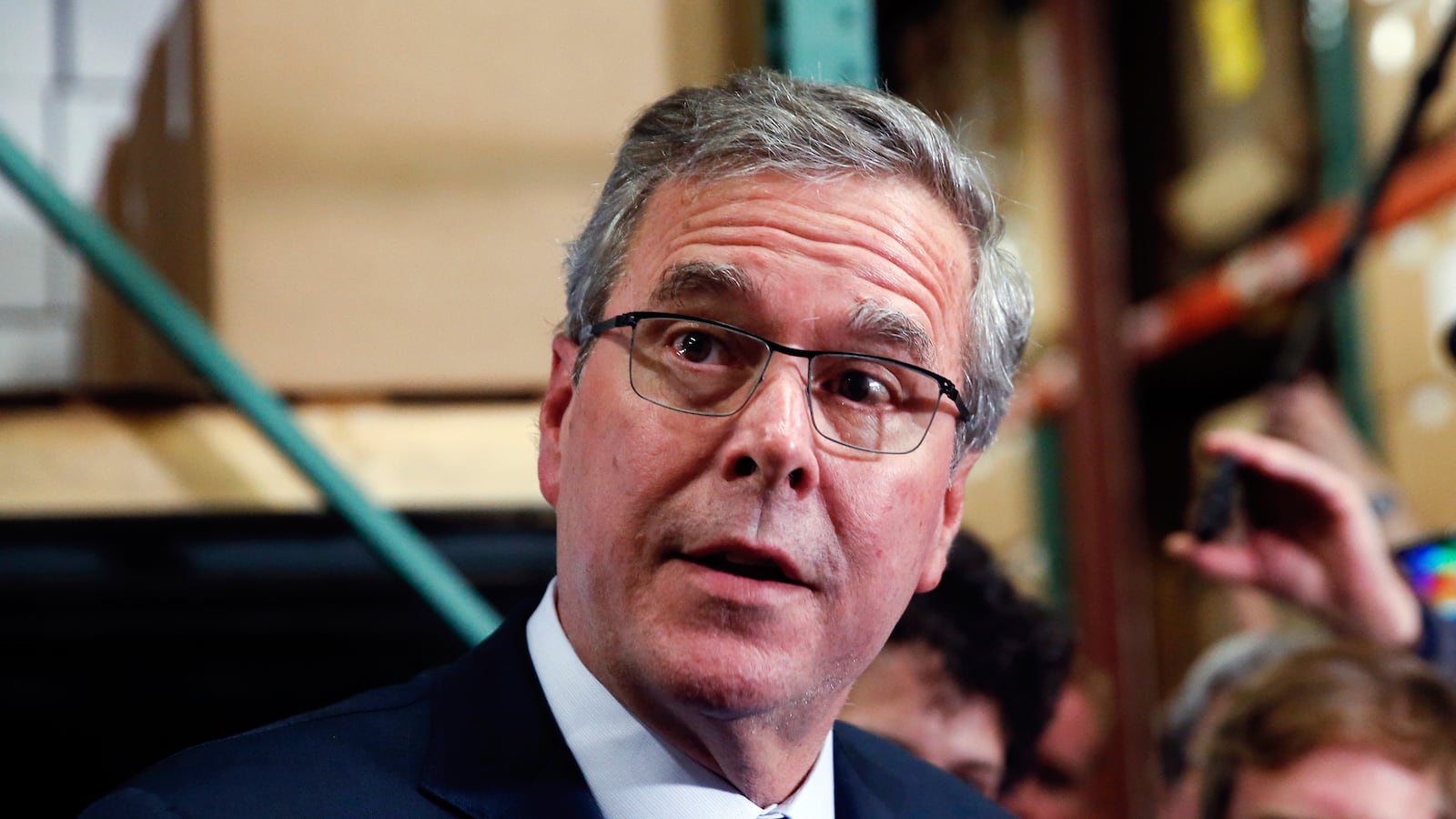Jeb Bush left Protestantism in his 40’s to convert to Roman Catholicism, and he’s widely perceived as the most moderate potential 2016 presidential contender.
So, at first blush, it may seem a little odd that Liberty University—the largest Christian (mostly evangelical) university in the country—gave him the honor of delivering its commencement address.
Liberty is nothing if not conservative. And conservatives hate the establishment. Right?
Wrong.
In fact, the Bush family and the Falwell family are a match made in heaven. And their bond is likely to be a boon to Jeb’s White House dreams.
Jerry Falwell, the single most influential conservative Christian power broker of the 20th century, founded Liberty in 1971 to foster evangelicals’ political and cultural clout.
Since then, the school has had some dramatic ups and downs, with the downs reaching their lowest in 1990 when the school faced $110 million in debt.
But Falwell died and God provided: Thanks in part to the pastor’s hefty life insurance policy, the school paid its dues, got in the black, and catapulted to a higher place than ever in the conservative firmament.
And even when it was short on money, it never lost its political cachet.
The histories of the university and the Bush dynasty are closely intertwined.
In 1980, former congressman and U.N. ambassador George H. W. Bush ran for the Republican presidential nomination with a less-than-red-meat record, and he was pro-choice as Reagan’s vice president. His beliefs could have permanently soured his reputation with evangelicals.
That’s where Falwell comes in: The reverend endorsed Bush in the 1988 Republican presidential primary, even though Pat Robertson—an evangelical televangelist whose ideological resume had much more overlap with Falwell’s—was also a contender.
This has often been chalked up to rivalry between the two preachers. But it was more than that.
“Establishment recognizes establishment,” said one prominent evangelical leader who was close with the late Falwell.
As he explained, Southern evangelicals have been part of their region’s cultural establishment for decades, and in a way that their Northern counterparts couldn’t have dreamed.
When it comes to said cultural establishments, Northern evangelicals have been on the outside looking in, while those from the South have been on the inside looking out. So Southern evangelicals are much more comfortable with the possession and the exercise of cultural and political power than Northern evangelicals are. And nobody possessed and exercised political power quite like the Bushes, including Bush 41, a literal senator’s son.
So Falwell had an immediate commonality with the Bushes that helped solidify their relationship. They may have differed in policy, theology, rhetoric and a host of other details. But in one key area, they had everything in common: In their respective spheres, they were boss.
“These two families have each played an iconic role in modern, American politics, and their influence has intersected on not a few occasions,” said Johnnie Moore, a former senior vice president of Liberty University.
“When it did intersect, it was a force to be reckoned with. There will be two political dynasties represented on that stage at Liberty University this weekend whose influence is not only undeniable, it's incalculable.”
In 1990, Bush found himself at Liberty, standing shoulder-to-shoulder with the reverend and delivering the commencement address to a crowd of evangelical voters who had helped secure his predecessor’s legacy.
And Bush 43 wasn’t the only so-called establishment-type to win Falwell’s imprimatur.
A few years after Sen. John McCain put him on his list of “agents of intolerance,” the pastor invited him to deliver the university’s 2006 commencement address.
The two broke bread, a reconciliation that boosted McCain’s 2008 presidential efforts.
And Falwell’s son, Jerry Falwell Jr., invited Mitt Romney to give the school’s 2012 commencement address. His decision to give that platform to a Mormon enraged many conservative Christians. But Jerry Jr. and Mitt Romney had commonality where it counted: They were both the heirs of dynasts.
If George H. W. Bush had a good relationship with the evangelicals in Falwell’s orbit, George W. Bush had a magnificent one.
“In 41, they’d take our calls,” said the aforementioned evangelical leader. “In 43, they’d call us.”
And now it’s Jeb’s turn.
And Liberty’s protestants will likely make him feel right at home.
And even though he’s pledged allegiance to Rome, they still see him as one of their own: the kid brother of their favorite president ever and the unabashed social conservative icon who tried to keep Terri Schiavo alive.
And, per excerpts of his speech provided to reporters in advance, Jeb will speak their language.
“Whatever the need, the affliction, or the injustice,” he plans to say, “there is no more powerful or liberating influence on this earth than the Christian conscience in action.”
“Consider a whole alternative universe of power without restraint, conflict without reconciliation, oppression without deliverance, corruption without reformation, tragedy without renewal, achievement without grace,” he’ll add, “and it’s all just a glimpse of human experience without the Christian influence.”
Consider a country without Falwell’s influence, and you might be considering a country without the Bushes.






